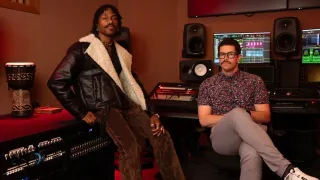October 26, 2018
Life
Kevin Schattenkirk READ TIME: 4 MIN.
The iconic 80s band Culture Club has been writing, recording and regularly touring since 2014. The band's sixth studio album, "Life," is their first since 1999. Their iconic singer, Boy George, recently describe "Life" as the album they had been trying to make since "Colour By Numbers," their 1983 artistic and commercial breakthrough. Like that album, "Life" is a testament to a band at the height of their creativity.
At the risk of essentializing their complex history: Culture Club's debut album, "Kissing to Be Clever," (1982) spawned hits in "I'll Tumble 4 Ya" and "Do You Really Want to Hurt Me?" In 1983, the band released "Colour By Numbers," which produced several more hits ("Karma Chameleon," "Miss Me Blind" and "It's a Miracle" among others). Pressured for a quick follow up, the band reluctantly recorded "Waking Up With the House on Fire" (1985) and "From Luxury to Heartache" (1986) before ending their '80s tenure. Additionally, Boy George's heroin addiction and his tumultuous relationship with drummer Jon Moss also halted the band's work.
Having kicked heroin, Boy George embarked upon an adventurous and prolific, if not always commercially successful, solo career in 1987. While Culture Club never officially disbanded, they were never far from reach. In 1998, they recorded and released an episode of "VH1 Storytellers Live." Their fifth album "Don't Mind If I Do" came in 1999, followed by a comprehensive box in 2002. After a 2011 New Year's Eve concert in Sydney, Australia, Culture Club began regular work together again, appearing to be full-time at least since 2014.
"Life" is the next step forward from Boy George's excellent 2013 album "This is What I Do." However, "Life" is more uptempo, trading in Culture Club's characteristic hybrid of pop, soul, funk and reggae. Bandmates Roy Hay (guitar and keyboards), Mikey Craig (bass) and Jon Moss (drums) lay a solid foundation upon which each song is decorated with strings, horns, backing vocalists, percussion, synths and loops. Don't be mistaken: This isn't a mere retread of everything we've ever loved about the band. "Life" is marked by thematic maturity and muscial growth, a beautifully eclectic addition to their discography.
Boy George's lyrics navigate giving and receiving love in a world that often barricades happiness; songs of spiritual exploration about finding our place, wrestling with injustices in personal and socio-political realms, and how we negotiate longing with fulfilment. "God & Love" opens the album. Over dark electro textures, punctuated by live drums and distorted guitar, the lyric compels us to walk our talk. In matters of faith and relationships, actions speak more for one's integrity than mere chatter: "God and love must be done."
"Bad Blood" and "Different Man" tackle addiction. The former addresses an addict yet to identify their problem ("You want to talk, but do you want the truth?"), where the latter is a testament to post-rock-bottom transformation. "Bad Blood" trades in darker disco, where "Different Man" recalls the funk of "Everyday People" by Sly and the Family Stone (Stone partly inspired the lyrics) with propulsive bass, horns and gospel choir. Another of the album's more serious moments, "What Does Sorry Mean," juxtaposes lilting reggae and '70s soft rock with lyrics about a domestic abuse victim who hasn't yet mustered the strength to leave.
The remaining songs tend toward interpersonal relationships. In the Soca-flavored "Human Zoo," a despairing would-be-somebody's-lover is urged to "Look around the human zoo, there's somebody there for you; look where love has never been, where love will never go." Then in the reggae of "Let Somebody Love You," Boy George declares that "Love is revolution, war and famine too," before advising us to "Feed the hunger in your heart, let somebody love you." It is the ups and downs, and not a misguided ideal of fairytale romance, that can lead to fulfilment.
"Runaway Train," originally a country song performed during the band's 2015 tour, is transformed here into a Sharon Jones & the Dapp Kings styled R&B number. Also, "More Than Silence," a rock song that examines the moments in relationships where words, or sometimes their absence, can effectively communicate. The title track, replete with strings, horns, and gospel choir, closes the album on a reflective note that especially resonates in today's world: "We look for laughter in the madness, you give me hope and you give me life."
The only missteps include the unfortunate titling of "Resting Bitch Face" (which is actually an infectious funk track) and the opening line from the piano ballad "Oil and Water" (a clich� atypical of Boy George's style: "You cry over spilt milk"). Minor quibbles aside, both songs are enjoyable and do not detract from the overall album.
Throughout, Boy George's voice is as soulful as any of his best musical moments. The rest of the band are rock solid. Craig, in particular, provides several songs with juicy bass lines – he is perhaps one of the most under-appreciate bassist in pop music. If this is the album Culture Club has been chasing since "Colour By Numbers," then "Life" is certainly well worth the wait.
"Life"
by Culture Club
$17.99 (CD), $23.99 (vinyl)
https://cultureclub.tmstor.es/






